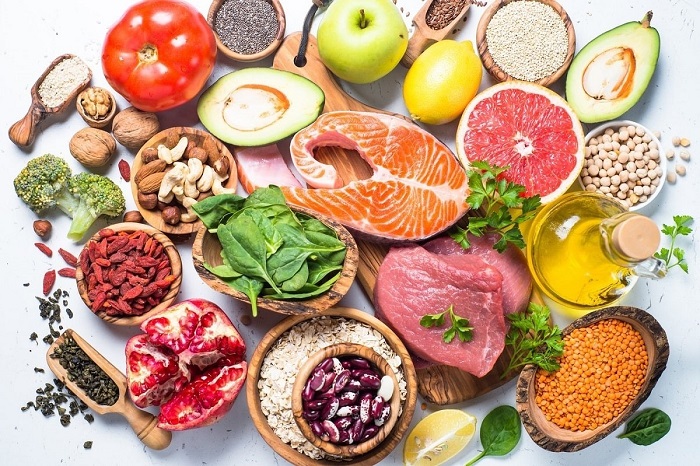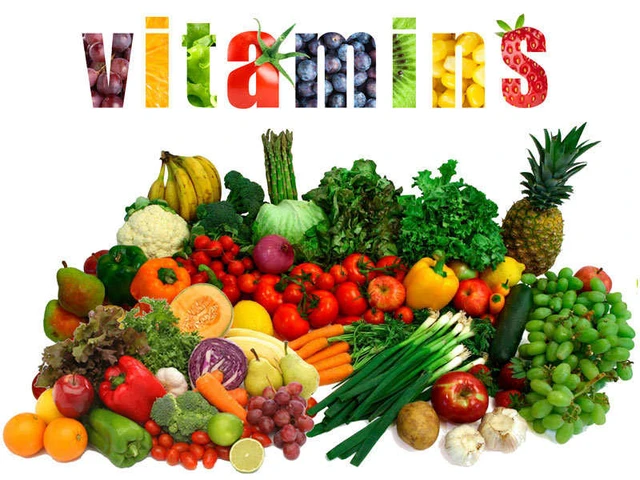To keep the body healthy and functioning at its best, it always needs a lot of essential nutrients, such as calcium, phosphorus, selenium, other vitamins and minerals. However, not everyone knows how to supplement nutrients properly.
1. Macronutrients and micronutrients
Each type of food provides our body with a variety of different nutrients and brings great benefits, such as providing essential energy for activities or protecting and enhancing the body’s development.
Normally, macronutrients will include carbohydrates, proteins and fats. These are all nutrients that you should consume in relatively large amounts through your daily diet.
For the micronutrient group, it will mainly include vitamins and minerals. These nutrients are also very important for the body, so you need to supplement them in sufficient amounts for the body to function normally.
2. Carbohydrates, proteins and fats (macronutrients)
Here is detailed information about the macronutrient group, including:
- Carbohydrates : This is an extremely important nutrient, helping to provide the necessary energy source for the body. You can supplement carbohydrates through starchy foods, such as rice, potatoes, bread, breakfast cereals and pasta. In addition, carbohydrates also exist in simpler sugar forms and are often found in vegetables, fruits and milk.
- Fiber : Is a term used for carbohydrates that cannot be digested in the body. Fiber plays a very important role in our health. It has the ability to significantly reduce the risk of causing some diseases, such as type 2 diabetes, heart disease and colon cancer. In addition, fiber also contributes to improving digestive health, thereby reducing constipation. The most abundant sources of fiber come mainly from breakfast cereals, whole-wheat pasta, whole-grain bread, beans, vegetables and fruits.
- Protein : This nutrient helps to increase many essential amino acids that the body cannot produce on its own. You can supplement protein through your daily diet. In general, protein is essential for normal development and maintaining good health. In addition, it also contributes to providing energy for the body’s vital activities. You can increase the amount of protein in your body by eating a lot of foods such as fish, eggs, meat, cereal products (such as bread), dairy products, soy products, beans and nuts.
- Fat: Helps provide essential fatty acids that the body cannot produce on its own. In addition, fats, like other nutrients, provide the body with an abundant source of energy for a variety of body processes, while maintaining the normal structure of cells. You can supplement fats through foods such as meat, meat products, oily fish, dairy foods, nuts and avocados.

Macronutrients will include carbohydrates, proteins and fats.
3. Vitamin B, folate and vitamin C (water-soluble vitamins)
In general, water-soluble vitamins are not stored in our bodies. If you have more of these vitamins than you need, your body will eliminate the extra vitamins through your urine. Typically, water-soluble vitamins include vitamin B1, vitamin B2, vitamin B3, vitamin B6, vitamin B12, vitamin C and folate.
- Vitamin B1 (Thiamine): This vitamin helps the body release energy from food. In addition, it also helps the heart and nervous system function more healthily. You can find vitamin B1 in foods such as bread, nuts, breakfast cereals, beans, peas and pork.
- Vitamin B2 (Riboflavin): Helps the body release energy from food and protects healthy skin. Moreover, it also helps improve the function of the nervous system and reduces fatigue. Food sources rich in vitamin B2 include eggs, milk, dairy products, breakfast cereals, organ meats, oily fish (such as sardines and mackerel), almonds and mushrooms.
- Vitamin B3 (Niacin): This vitamin also plays a similar role to vitamin B2, helping to release energy from food and maintain normal skin. It also plays an important role in improving the function of the nervous system and reducing fatigue. You should supplement vitamin B3 through the following food sources: Poultry, meat, shellfish, fish, brown rice, quinoa, whole-wheat pasta, bread, peanuts and sesame seeds.
- Vitamin B6: Promotes the body to produce more red blood cells and transport oxygen throughout the body. In addition, vitamin B6 also helps increase the resistance of the immune system, regulate hormones and reduce fatigue. Foods rich in vitamin B6 include fish, meat, poultry, egg yolks, breakfast cereals, soybeans, yeast extracts, sesame seeds, vegetables and some fruits (e.g. avocados, bananas and green peppers).
- Vitamin B12: Like vitamin B6, vitamin B12 also helps the body produce more red blood cells, which carry oxygen throughout the body and improve the health of the immune system. You should add more vitamin B12 to your diet through foods such as eggs, milk, shellfish, fish, meat, cheese, mushrooms, yeast extracts and breakfast cereals.
- Folate/folic acid: This is considered one of the very important nutrients for the normal development of the nervous system in the fetus. Therefore, pregnant mothers should increase folate supplementation in their special diet through foods such as brown bread, green vegetables, organs, peas, oranges, berries and breakfast cereals.
- Vitamin C: This vitamin plays a major role in preventing and protecting cells in the body from damage. It is also involved in the formation of collagen, which is essential for the health of gums, teeth, bones and skin. On the other hand, vitamin C also helps the immune system and nervous system function normally. Normally, vitamin C is abundant in citrus fruits, black grapes, papaya, strawberries, kiwi, or green vegetables, tomatoes and peppers.

Water-soluble vitamins include vitamin B1, vitamin B2, vitamin B3
4. Vitamins A, D, E and K (fat-soluble vitamins)
Fat-soluble vitamins are usually absorbed through the intestines with the help of fat. They include vitamin A, vitamin D, vitamin E and vitamin K.
- Vitamin A: Helps improve the functioning of the immune system, while also enhancing vision, protecting the skin and mucous membranes of some parts of the body, such as the nose. You can find sources of vitamin A in foods such as cheese, liver, eggs, fruits, dark green leafy vegetables, carrots, pumpkin, sweet potatoes, papaya and cantaloupe.
- Vitamin D: Helps your body absorb calcium and helps strengthen bones. In addition, it also helps the immune system and muscles of the body work more effectively. Vitamin D is often found in oily fish, breakfast cereals, eggs and fats. In the summer, you can also get vitamin D through exposure to UV rays on the skin through sunlight.
- Vitamin E: Plays a major role in protecting the body’s cells from damage. Good dietary sources of vitamin E include vegetable oils, olive oil, sunflower oil, rapeseed oil, peanuts, almonds or avocados.
- Vitamin K: Is especially necessary for normal blood clotting in the body. It is also important for healthy bone structure. Vitamin K is found in green leafy vegetables, green beans, broccoli, peas, olive oil, canola oil and soybeans.
5. Essential Minerals
Our bodies need a number of essential minerals to function properly. These include calcium, fluoride, iodine, iron, magnesium, phosphorus, potassium, selenium, sodium and zinc.
- Calcium: Helps build and maintain strong teeth and bones, and improves muscle and nerve function. In addition, calcium is also involved in the body’s normal blood clotting process. You can supplement calcium through eating cheese, milk, herbs, kale, canned fish, calcium-fortified dairy products, and bread.
- Fluoride: Helps maintain and strengthen teeth, while significantly reducing the risk of tooth decay. It is abundant in tea, tap water, and toothpaste.
- Iodine: Helps the body produce thyroid hormones. In addition, it helps improve brain health. You can supplement iodine through cheese, milk, yogurt, shellfish, fish, and eggs.
- Iron: Helps create red blood cells and provide oxygen to the entire body. In addition, it also helps the immune system and brain function more effectively. Iron is abundant in foods such as red meat, organ meat, beans, nuts, fish, oysters, whole-wheat bread, quinoa, and dried fruit.
- Magnesium: Helps the body release energy from food consumption, and also helps maintain strong bones. Foods high in magnesium include breakfast cereals, nuts, whole grains, brown rice, and quinoa.
- Phosphorus: Helps keep teeth and bones strong. It also helps the body release energy from food. You can find phosphorus in yogurt, cheese, fish, milk, poultry, red meat, eggs, whole grain breads, and cereals.
- Potassium: Helps regulate the amount of water in the body and maintain normal blood pressure levels. In addition, potassium also helps muscles and nerves function properly. Food sources rich in potassium include: Avocados, bananas, spinach, beets, turnips, dried fruit, red meat, poultry, milk, fish, and whole grains.
- Sodium: Helps regulate the amount of water in the body. However, sodium is very low in natural foods. It is often added to foods as salt (sodium chloride) during preparation, processing and preservation.
- Selenium: Helps protect cells in the body from damage. Selenium is also helpful in keeping skin and nails healthy, and helps maintain normal fertility in men. This mineral is abundant in some nuts (such as cashews and sunflower seeds), eggs, fish, shellfish and poultry organs.
- Zinc: Helps improve your motor and mental skills. In addition, it also helps protect the health of hair, skin and nails. You can supplement zinc to heal wounds quickly and improve your fertility. Zinc is often abundant in cheese, poultry, meat, crab, mussels, oysters, pumpkin seeds, pine nuts and whole grains.

Our bodies always need some essential minerals to be able to function properly.
6. How should I take vitamins and minerals?
Most of us can get all the vitamins and minerals we need through a healthy, varied diet without needing to take supplements from other sources. However, there are some exceptions where supplements are recommended, including:
- Women who are pregnant or planning to become pregnant: Folic acid should be taken daily until the 12th week of pregnancy. This will help prevent birth defects such as spina bifida.
- Vitamin D is only found in a few foods. Therefore, the Ministry of Health has recommended that children aged 5 years and older and adults take vitamin D supplements during the winter months.
- If your doctor prescribes supplements, you must take them as directed.
If you are considering adding vitamins and minerals to your diet, you should talk to a nutritionist to determine if they are necessary for your needs or if they will interact with any medications you are taking. Also, before taking any supplements, read the label carefully and make sure you do not exceed the recommended dose.
7. Water
Water is not defined as a nutrient, but it is a liquid that is essential for the body to function properly and efficiently. In fact, water helps regulate body temperature, transport nutrients to all organs, and maintain brain health.
Water can include the following beverages: Water, juice, coffee, and tea. Normally, we will actually get about 20% of our water from the foods we consume every day. You may find that some foods contain a lot of water, including vegetables, fruits, soups, sauces, and stews.





